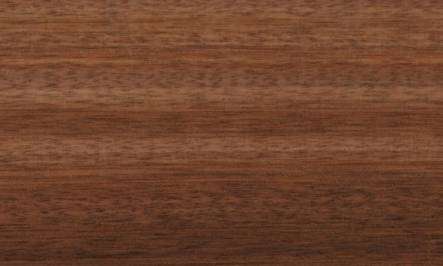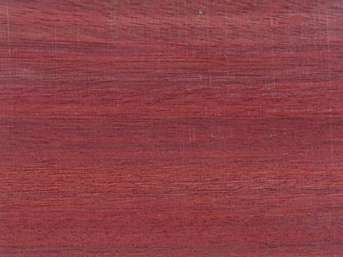 
Adda (Brosimum paraense)
Family: Moraceae
Common names: Adda, Ajeersi, Bloodwood, Bois baroit, Bois de Cayenne, Bois de feroles, Bois de lettre rouge, Bois satine, Brazil redwood, Cacique, Cardinal wood, Conduru, Conduru de sangue, Dukaliballi, Gonduru, Marequende, Meurapiranga, Moira-piranga, Muirapiranga, Oolemeriballi, Palo de sangre, Palo sangre, Pao rainha, Partridgewood, Satijnhout, Satinay, Satine, Satine gris, Satine rubane, Satine rubanne, Satinwood, Sokoneballi, South American satinwood, Warimibali
Distributed in: Brazil, French Guiana, Guyana, Panama, Peru, Suriname, Venezuela (Central America, Latin America)
Common uses: Agricultural implements, Boat building: framing, Cabinetmaking, Carvings, Chairs, Fishing rods, Flooring, Furniture, Heavy construction, Joinery, Light construction, Mathematical instruments, Mine timbers, Poles, Railroad ties, Roofing, Sporting Goods, Tool handles, Turnery, Vehicle parts, Veneer: decorative
Environment profile: Vulnerable
Tree size: Trunk diameter is 200-250 cm
Colors: the heart isWhite, Yellow to golden-yellow to orangeand the sapwoodWhite, White to yellow.The grain isWavy, the textureUniformand the lusterPronounced
Natural durability: Very durable, Very durable
Kiln Drying Rate: Naturally dries slowly
Drying Defects: Checking, Splitting
Ease of Drying: Thick Stock Requires Care
Tree Identification: Bole/stem form is cylindrical
Comments: General finishing qualities are rated as good
Blunting Effect: Little
Boring: Fair to good results
Carving: Fair to Good Results
Cutting Resistance: Easy to saw
Gluing: Fairly Easy to Very Easy
Mortising: Fair to Good
Moulding: Fair to Good
Movement in Service: Fair to Good
Nailing: Difficult to nail, Possible if prebored
Planing: Very Good to Excellent
Response to hand tools: Responds Readily
Sanding: Very Good to Excellent Results
Veneering qualities: Veneers easily, Veneers moderately easy
Turning: Very Good to Excellent Results
Polishing: Satisfactory; Staining: Very Good to Excellent;
- Numerical data Metric
- Numerical data English
- Strength properties
- References
 |
 |
 |
 |
| Item |
Green |
Dry |
Metric |
| Specific Gravity |
|
|
|
| Density |
|
865 |
kg/m3 |
| Bending Strength |
1026 |
1518 |
kg/cm2 |
| Crushing Strength |
|
|
kg/cm2 |
| Hardness |
|
|
kg |
| Impact Strength |
|
|
cm |
| Shearing Strength |
|
|
kg/cm2 |
| Stiffness |
|
|
1000 kg/cm2 |
| Tangential Shrinkage |
8 |
|
% |
| Radial Shrinkage |
5 |
|
% |
| Weight |
849 |
721 |
kg/m3 |
| Maximum Load |
|
|
cm-kg/cm3 |
| Toughness |
|
|
cm-kg |
| Static Bending |
|
|
kg/cm2 |
|
 |  |  |  | | Item | Green | Dry | English | | Bending Strength | 14597 | 21597 | psi | | Density | | 54 | lbs/ft3 | | Weight | 53 | 45 | lbs/ft3 | | Radial Shrinkage | 5 | | % | | Tangential Shrinkage | 8 | | % | | Volumetric Shrinkage | 11 | | % | |
Density (dry weight) = 61-67 lbs/cu.ft.
Dnesity (dry wieght) = 53-60 lbs/cu. ft.
Shrinkage, Tangential = moderate
Shrinkage, Volumetric = moderate
Shrinkage, Tangential = large
Shrinkage, Tangential = fairly large
Shrinkage, Radial = large
Shrinkage, Radial = fairly large
Density (dry weight) = 67-75 lbs/cu. ft.
Density (dry weight) = 46-52 lbs/cu. ft.
Density (dry weight) = 38-45 lbs/cu. ft.
Bending strength (MOR) = very high
Bending strength (MOR) = medium
Bending strength (MOR) = high
Almeida, D.G. de, Costa, J.R. da,1956,Madeiras do Brasil. (Timbers of Brazil.,Min. Ag. Servico de Economia Rural, Rio de Janeiro, Brazil,pp56Berni, C.A., Bolza, E., Christensen, F.J.,1979,South American Timbers - The Characteristics, Properties and Uses of 190,Species,C.S.I.R.O Div. Building ResearchBrown, W.H.,1978,Timbers of the World, No. 2 South America,TRADA, Red Booklet SeriesEdmondson, C.H.,1949,Reaction of Woods from S.America and Caribbean areas to Marine Borers in,Hawaiian Waters,Caribbean Foresters,10(1,PP37-41Erfurth, T., Rusche, H.,1976,The Marketing of Tropical Wood B. Wood Species from S. American Tropical,Moist Forests,F.A.O. Forestry DepartmentFanshawe, D.B.,1954,Forest Products of British Guiana Part 1 Principal Timbers,Forest Department British Guiana Forestry Bulletin (New Series 2nd,Edition,No.1Kribs, D.A.,1950,Commercial and Foreign Woods on the American Market (a manual to their,structure, identification, uses and distribution,U.S.A. Penn. State College, Tropical Woods LaboratoryRecord, S.J., Hess, R.W.,1940,American Woods of the Family Moraceae,Tropical Woods,8(61,pp11-54Record, S.J., Hess, R.W.,1943,Timbers of the New World,Yale University PressRecord, S.J., Mell, C.D.,1924,Timbers of Tropical America,Yale Univ. PressRizzini, C.T.,1978,Arvores e Madeiras Uteis do Brasil: Manual de Dendrologia Brasileira,Editora Edgard Blucher LTDA BrazilSurinam Forest Service,1952,Surinam Timber - A Summary with brief descriptions of the main timber,species of Surinam,Surinam Forest ServiceVink, A.T.,1965,Surinam Timbers,Surinam Forest Service Paramaribo,3rd rev. ed.Wolcott, G.N.,1940,A List of the Woods arranged according to their resistance to the attack,of,the 'Polilla', the Dry-wood Termite of the West Indies, Cryptotermes,brevis Walker,Caribbean Forester,1(4,PP1-10Woods, R.P.,1949,Timbers of South America,TRADA, Red Booklet SeriesWood, B., Calnan, D.,1976,Toxic Woods,British Journal of Dermat 94 Suppl. 13
|









